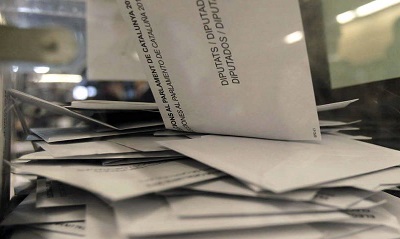Research studies the interconnections between the various electoral areas in Spain, France and Germany
Research studies the interconnections between the various electoral areas in Spain, France and Germany
Research studies the interconnections between the various electoral areas in Spain, France and Germany
The study involves the participation of Ignacio Lago, professor with the Department of Political and Social Sciences, and has been published by Oxford University Press in the book Multi-Level Electoral Politics. Beyond the Second-Order Election Model.
 International research with the participation of Ignacio Lago, professor with the Department of Political and Social Sciences at UPF for the first time performs a systematic analysis of multi-level electoral politics, corresponding to European, state and sub-state (or regional) elections in three European countries: Spain, France and Germany.
International research with the participation of Ignacio Lago, professor with the Department of Political and Social Sciences at UPF for the first time performs a systematic analysis of multi-level electoral politics, corresponding to European, state and sub-state (or regional) elections in three European countries: Spain, France and Germany.
The study, which examines how the decentralization of political and economic power influences the behaviour of parties and voters, has been included in a book entitled Multi-Level Electoral Politics. Beyond the Second-Order Election Model, published in 2017 by Oxford University Press, which presents a new model far from the traditional hierarchy between elections.
Based on the study of the various elections in the period 2011-2015, the work reflects how in today’s democracies, political power is dispersed at various levels of government, and the citizens elect their representatives in multiple electoral spheres. In this context, political behaviour at a certain level is influenced by what happens at other levels.
Analysing the various elections from the same plane
The research, conducted on the basis of qualitative and quantitative data (surveys, content analysis of campaign materials and interviews with their managers) goes beyond the second-order electoral model, the most influential framework so far to explain multi-level electoral policy.
In the second-order model, elections at state level are considered first-order and other elections, rather secondary. But this model does not explain how the elections in one area affect those of another, or the changes in the behaviour of individual voters.
The new multi-level model, rather than focusing on one isolated level or only on the voters, explains how the behaviour of the party and of the voter, in certain elections, is affected by the existence of different electoral scenarios, based on which policymakers are elected.
According to the authors, each electoral area provides different incentives that in a certain way affect the political behaviour of voters and party elites, and differently according to regions and countries. The micromechanisms that generate aggregated patterns of voting behaviour are shown in order to reveal previously hidden variations and relationships within each electoral area.
Some of the issues discussed in the work are the decisions taken by the party elites, campaign strategies, the options chosen by the voters in the many electoral areas, the factors that affect the place where the political actors put their resources, and how the voters react both with regard to the evaluation of the results of public policies and to the allocation of responsibilities.
A study that results from the a broad vision of politics
The book, which is part of the Making Electoral Democracy Work project, has been written by professors Ignacio Lago (UPF) Sona N. Golder (Pennsylvania State University, USA), André Blais (University of Montreal), Elisabeth Gidengil (McGill University of Montreal), both in Canada, and Thomas Gschwend (University of Mannheim, Germany).
They are all political observers and researchers who are interested in elections because they are concerned about representation, accountability, voter behaviour and party strategies.
The collaboration in this work by Ignacio Lago, who at UPF is a researcher at the Research and Expertise Centre for Survey Methodology (RECSM), is thanks to the results of the research project “Political and Economic Consequences of Decentralization” (2014-2017), of which he is the principal investigator, and is funded by the Spanish Ministry of Economy and Competitiveness.
